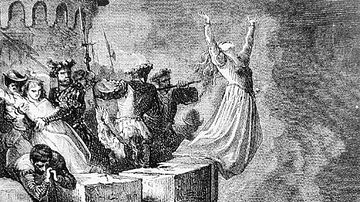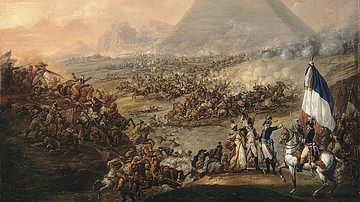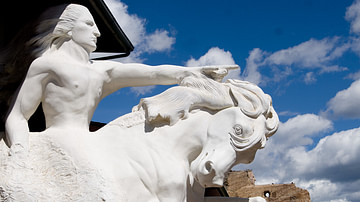Search
Did you mean: Vinland?
Search Results

Definition
Thomas Müntzer
Thomas Müntzer (l. c. 1489-1525) was a German theologian and apocalyptic preacher who became one of the leaders of the German Peasants' War (1524-1525). An early follower of the reformer Martin Luther (l. 1483-1546), Müntzer established his...

Article
The Sixteenth-Century Massacre of the Waldensians of Mérindol
As the Reformation developed in France in the first half of the 16th century, there were several episodes of severe repression which preceded the Wars of Religion (1562-1598). These were times of great hardship and oppression against those...

Article
Battle of the Pyramids
The Battle of the Pyramids (21 July 1798), or the Battle of Embabeh, was a significant battle fought during Napoleon's Campaign in Egypt and Syria. On a battlefield 15 km (9 mi) away from the Great Pyramid of Giza, Napoleon Bonaparte's French...

Article
Squanto in the Primary Sources
Squanto (l. c. 1585-1622 CE) is the best-known Native American of the pilgrim narrative, famous for helping the Plymouth Colony survive in 1621 CE. He makes up what scholar Charles C. Mann calls the “uneasy triumvirate” of Native Americans...

Article
Top 10 Archaeological Sites in Caria, Turkey
Located at the crossroads of many ancient civilizations, Turkey is a haven for archaeology lovers. Over the centuries, a succession of empires and kingdoms – Hittite, Lydian, Persian, Greek, Roman, Byzantine and, finally, Ottoman – ruled...

Article
Mandu - City of Joy
The city of Mandu is situated about 35 km from Dhar in the Madhya Pradesh region of northern-central India. Most of the city's monuments date to the 15th and 16th century CE. The city is located on a hill which rises 633 m above the sea level...

Article
Uʻtlûñ′tă, the Spear-Finger
Uʻtlûñ′tă, the Spear-Finger is a legend of the Cherokee nation, defined as a wonder story – a tale involving a supernatural entity – in which higher powers contend with each other or mortals must navigate the supernatural world or defend...

Article
Black Elk on Crazy Horse
Black Elk Speaks (1932) is the popular and controversial book of the narrative by the Oglala Lakota Sioux medicine man Black Elk (l. 1863-1950) on his life and people as given to the American poet and writer John G. Neihardt (l. 1881-1973...

Article
How the Turtle Went to War
How the Turtle Went to War (also Turtle Goes to War) is a Native American legend commonly associated with the Cheyenne, Arapaho, and Sioux nations, but the narrative also appears in the stories of the Blackfoot Confederacy, the Haudenosaunee...

Article
The Boy Who Saw A-ti'us
The Boy Who Saw A-ti'us is a legend of the Pawnee nation about a young man who is granted a vision of the Creator Ti-ra'wa A-ti'us (also known simply as Ti-ra'wa or as A-ti'us) and, through his faith, is able to see what others cannot and...